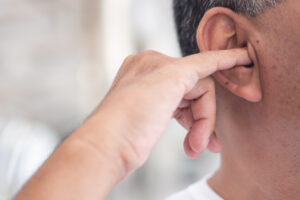October 06, 2021 | Black & Kletz Allergy
 The Eustachian tube is a small tubular passageway that connects the middle ear with the junction of the back of the nose and upper throat. It is approximately 1.5 inches long and 3 mm. (0.12 inches) in diameter. It is the structure in the ear that pops when one goes to high altitudes or descends deep in the water. The tube helps to regulate pressure in the middle ear, shield the ear from hearing its own body noises, and drain fluid from the middle ear. The Eustachian tube has a valve that opens and closes. If the tube stays open too much, one may get a constant feeling of increased pressure in one’s ear. In addition, one may hear their own body noises such as hearing one’s voice too loudly or hearing one’s own breathing. On the other hand, if the Eustachian tube stays closed, there may be a buildup of fluid which may result in a feeling of increased pressure and/or pain in the ear as well as a decrease in hearing.
The Eustachian tube is a small tubular passageway that connects the middle ear with the junction of the back of the nose and upper throat. It is approximately 1.5 inches long and 3 mm. (0.12 inches) in diameter. It is the structure in the ear that pops when one goes to high altitudes or descends deep in the water. The tube helps to regulate pressure in the middle ear, shield the ear from hearing its own body noises, and drain fluid from the middle ear. The Eustachian tube has a valve that opens and closes. If the tube stays open too much, one may get a constant feeling of increased pressure in one’s ear. In addition, one may hear their own body noises such as hearing one’s voice too loudly or hearing one’s own breathing. On the other hand, if the Eustachian tube stays closed, there may be a buildup of fluid which may result in a feeling of increased pressure and/or pain in the ear as well as a decrease in hearing.
Eustachian tube dysfunction occurs when the tube fails to open and gets stuck closed during swallowing or yawning. This results in a difference in the air pressure between the inside and outside of the middle ear.
The most common cause of Eustachian tube dysfunction is an upper respiratory infection (URI) such as the common cold, flu, or a sinus infection. Other causes of Eustachian tube dysfunction may include allergies (i.e., allergic rhinitis), enlarged tonsils/adenoids, nasal polyps, cigarette smoke, pollution, nasal tumors, cleft palate, and/or tumor at base of the skull. Note that the last 3 causes mentioned are fairly rare causes of Eustachian tube dysfunction.
We will focus on allergies as a cause for Eustachian tube dysfunction. Allergic rhinitis (i.e., hay fever) is a very common condition and accounts for a fair amount of Eustachian tube dysfunction. The classic symptoms of allergic rhinitis may include runny nose, nasal congestion, sneezing, post-nasal drip, snoring, itchy eyes, watery eyes, redness of the eyes, sinus pain/pressure, itchy nose, and itchy throat. As a result of a post-nasal drip, some individuals may experience hoarseness and a sore throat. Others may develop asthma symptoms such as chest tightness, coughing, wheezing, and/or shortness of breath.
Still others, however, may develop symptoms of Eustachian tube dysfunction. These symptoms may include clogged ears, hearing loss, increased ear pressure/pain, popping of the ears, vertigo/dizziness, and/or ringing of the ears (i.e., tinnitus). Allergies may cause a narrowing of the Eustachian tube opening or its passageway resulting in the symptoms described above.
The diagnosis of an allergic cause of Eustachian tube dysfunction begins with a comprehensive history and physical examination. If an allergy is suspected, allergy skin testing or blood tests may be performed. A CT scan of the sinuses may be ordered for individuals who present with recurrent or chronic sinus infections.
The management of the underlying allergies in patients with allergy-induced Eustachian tube dysfunction is the goal of treatment. Treating the underlying allergy may help to reduce the swelling in the lining of the Eustachian tube. Nasal corticosteroids are often effective in reducing the symptoms of Eustachian tube dysfunction. Oral or nasal decongestants may also be beneficial. Oral and nasal antihistamines have also proven beneficial in the treatment of allergic rhinitis. Allergy immunotherapy (i.e., allergy shots, allergy injections, allergy desensitization, allergy hyposensitization) is a very effective tool to treat allergic rhinitis as it works in 80-85% of patients on this therapy.
The board certified allergy doctors at Black & Kletz Allergy have been treating Eustachian tube dysfunction as well as allergies, sinus problems, and asthma. We have offices in Washington, DC, McLean, VA (Tysons Corner, VA), and Manassas, VA. We have been serving the Washington, DC, Northern Virginia, and Maryland metropolitan area for over 50 years and treat both adult and pediatric patients. All 3 offices at Black & Kletz Allergy offer on-site parking and the Washington, DC and McLean, VA offices are Metro accessible. There is a free shuttle that runs between our McLean, VA office and the Spring Hill metro station on the silver line. If you are concerned that you may have Eustachian tube dysfunction, allergies, sinus problems, asthma, hives, eczema (atopic dermatitis), or immune system problems, please call us to schedule an appointment. You may also click Request an Appointment and we will reply within 24 hours by the next business day. At Black & Kletz Allergy, we strive to improve the quality of life in allergic individuals in a professional and compassionate setting.












